
MENUMENU
TALK TO AN EXPERT
Special Hours: 7AM – 6PM PST
TALK TO AN EXPERT
Special Hours: 7AM – 6PM PST
What comes to mind when you think of the power a battery provides? Maybe it’s inserting your key into your vehicle’s ignition and then listening to the engine turn over and power on. Or holding the power button on the side of your laptop and watching the screen light up. While both battery-powered scenarios are quite common, did you know they use completely different battery types to produce power–a starter battery in the vehicle and a deep cycle battery in the laptop? In this blog, we’ll focus on the latter.
A “deep cycle” battery can discharge deeply, meaning it can reach a low charge state before needing recharging. It is able to supply electrical power over a long period continuously. Unlike starting batteries optimized for short bursts of high current to start an engine, deep cycle batteries are engineered to endure repeated charging and discharging cycles. The continued discharge and recharge cycle does not cause a significant loss of capacity or performance. Many applications that require energy to be stored, such as marine vessels, recreational vehicles, and renewable energy systems, utilize deep cycle batteries. Deep cycle batteries make for the best option for RV house battery banks.
But with so many different deep cycle battery types on the market, what is the best and long-lasting deep cycle RV battery? This article looks at lead acid, AGM, and lithium deep cycle batteries.
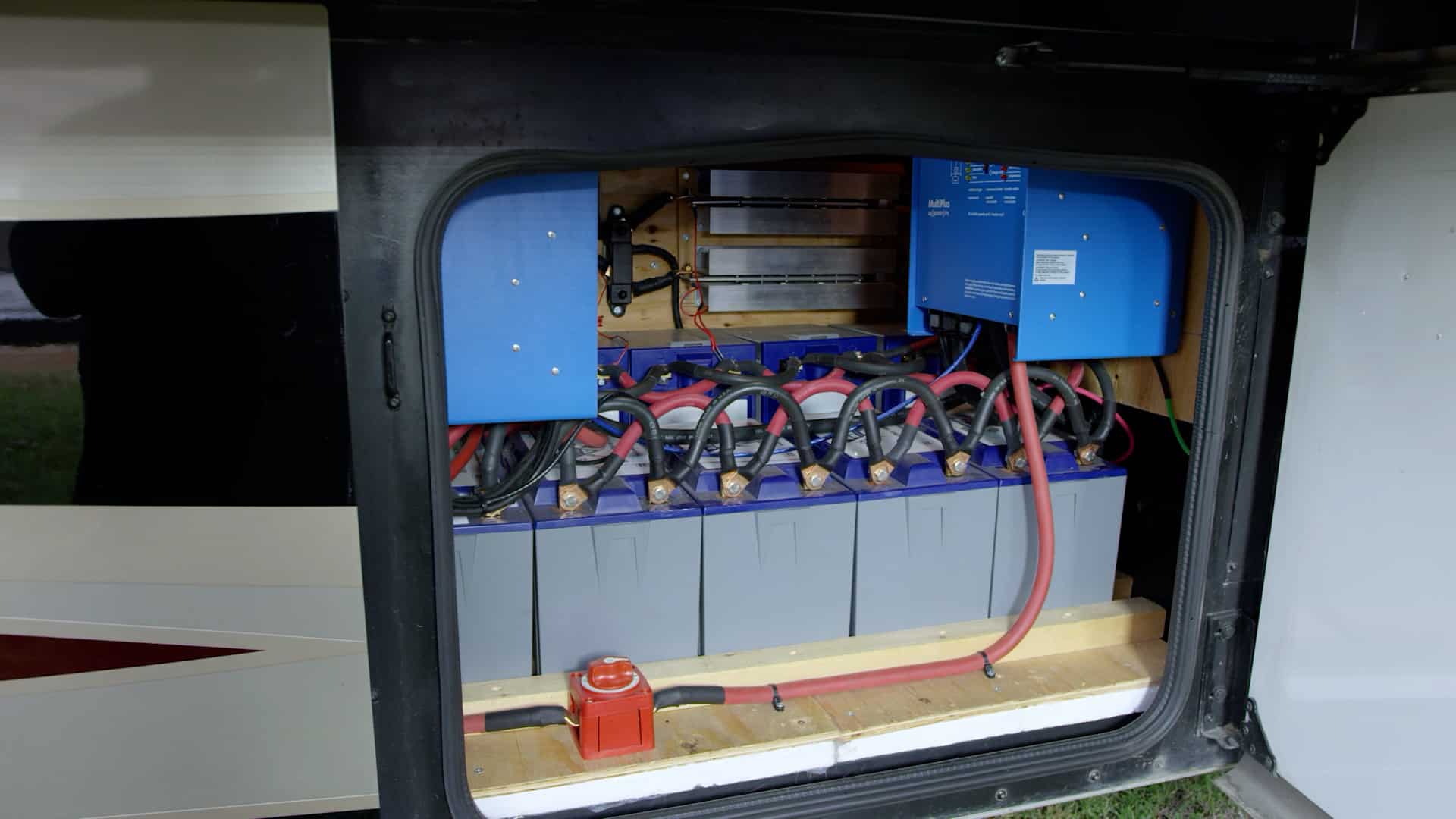
Deep cycle lead acid batteries deliver a steady and long-lasting electrical power supply. Although lead acid deep-cycle batteries can endure multiple charge and discharge cycles, it is imperative to avoid fully depleting their charge to 0%, one of lead acid batteries’ most significant issues. Doing this can lead to sulfating, which reduces battery life and performance over time.
Regular maintenance ensures lead acid deep cycle batteries’ optimal lifespan and efficiency. This includes monitoring and adjusting electrolyte levels in flooded lead acid batteries (the most common form of lead acid batteries), providing proper ventilation, and keeping the batteries clean and dry.
While they are inexpensive and widely available for energy needs, deep cycle lead acid batteries certainly have their share of cons. And proper recycling and disposal methods are necessary to manage the hazardous lead and sulfuric acid components, which are toxic to our environment.
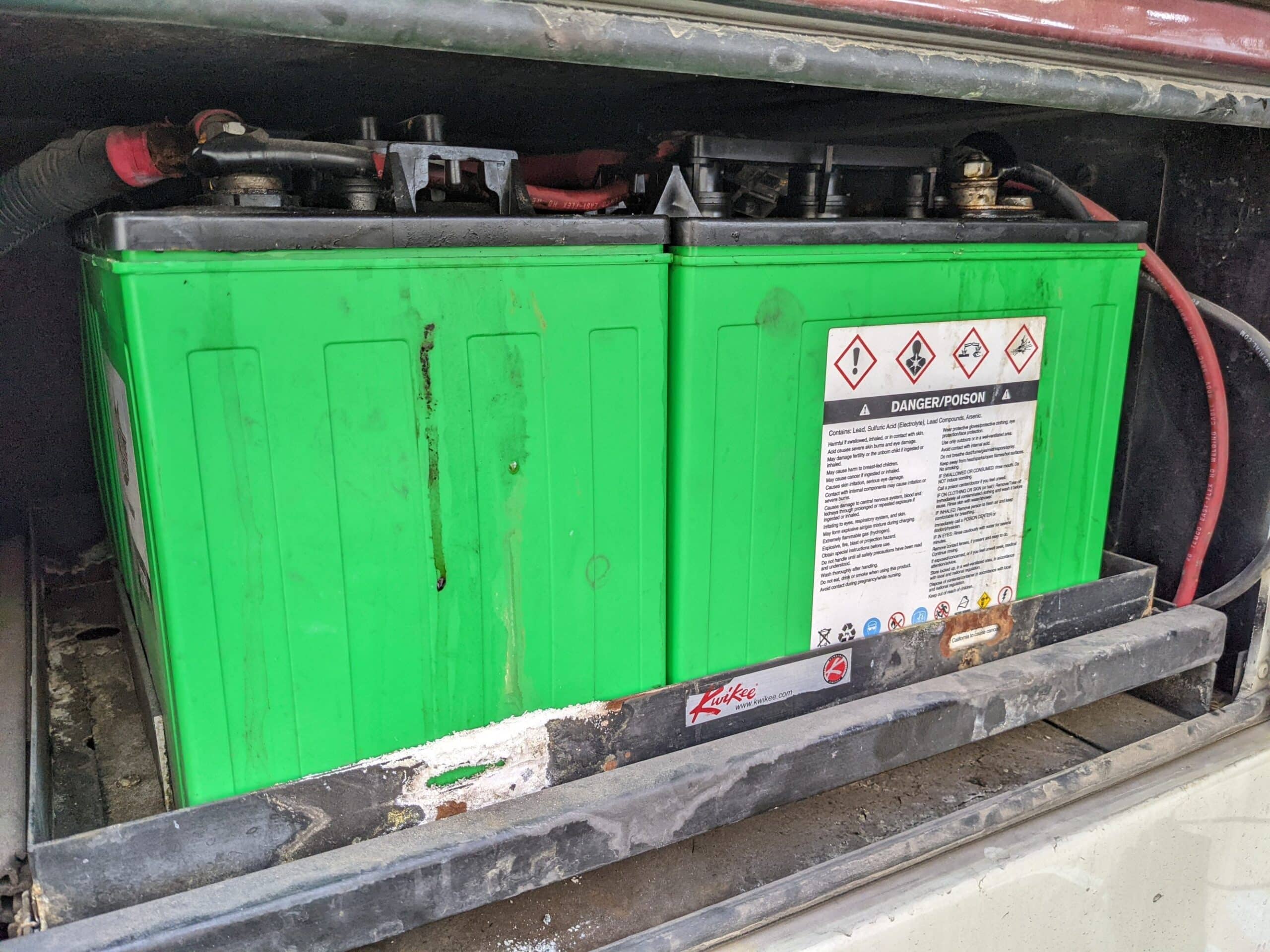
An AGM (Absorbent Glass Mat) deep cycle battery is a variant of traditional lead acid deep cycle batteries, but their unique construction sets them apart. AGM batteries use a design incorporating a fiberglass mat soaked in an electrolyte (a mixture of water and sulfuric acid) between the lead plates. The fiberglass mat is a separator and absorbs the electrolyte, immobilizing it to prevent spilling even if the battery is damaged or tipped.
These batteries exhibit a slightly lower energy density than other battery technologies. This means they may have a somewhat lower capacity for their size and weight, which is a concern for applications where maximizing energy storage in a limited space is critical. AGM batteries generally have a higher price tag than traditional flooded lead acid batteries. Like all lead acid batteries, AGM batteries may experience gradual capacity degradation over time. Frequent deep discharges or exposure to harsh conditions can accelerate this degradation process. Regular maintenance and proper charging practices can help mitigate this issue and extend the battery’s lifespan.
When considering AGM deep cycle batteries, it’s important to note that they have benefits and many drawbacks depending on the application’s specific needs. While the higher cost and slightly lower energy density may be limiting factors in some instances, proper care and attention to charging practices and environmental conditions can help.
Lithium deep cycle batteries have transformed the world of energy storage, offering many advantages over traditional battery technologies. These batteries provide long-lasting and reliable power, making them a top choice for users. Deep cycle lithium batteries are pivotal in efficiently storing excess energy generated from solar panels and wind turbines in renewable energy systems. This ensures a consistent power supply, even when renewable sources are not actively producing electricity (when the sun isn’t shining or the wind isn’t blowing).
Deep cycle lithium batteries are lightweight and compact, boasting an energy-to-weight ratio that tops all other traditional battery technologies. This is highly advantageous in weight and space-critical applications, allowing easy integration into various devices and systems without compromising performance. The high energy density of lithium deep cycle batteries will enable them to store a substantial amount of energy within a compact package, maximizing energy storage capabilities and extending run times. This efficiency ensures extended operational hours and increased efficiency. The design makes dropping them in as a replacement for lead acid batteries easy.
Lithium batteries also have fast-charging capabilities, allowing quicker charging than the alternatives and leading to reduced downtime. This feature is particularly valuable for time-sensitive applications with quick recharge, such as a short trip in your RV.
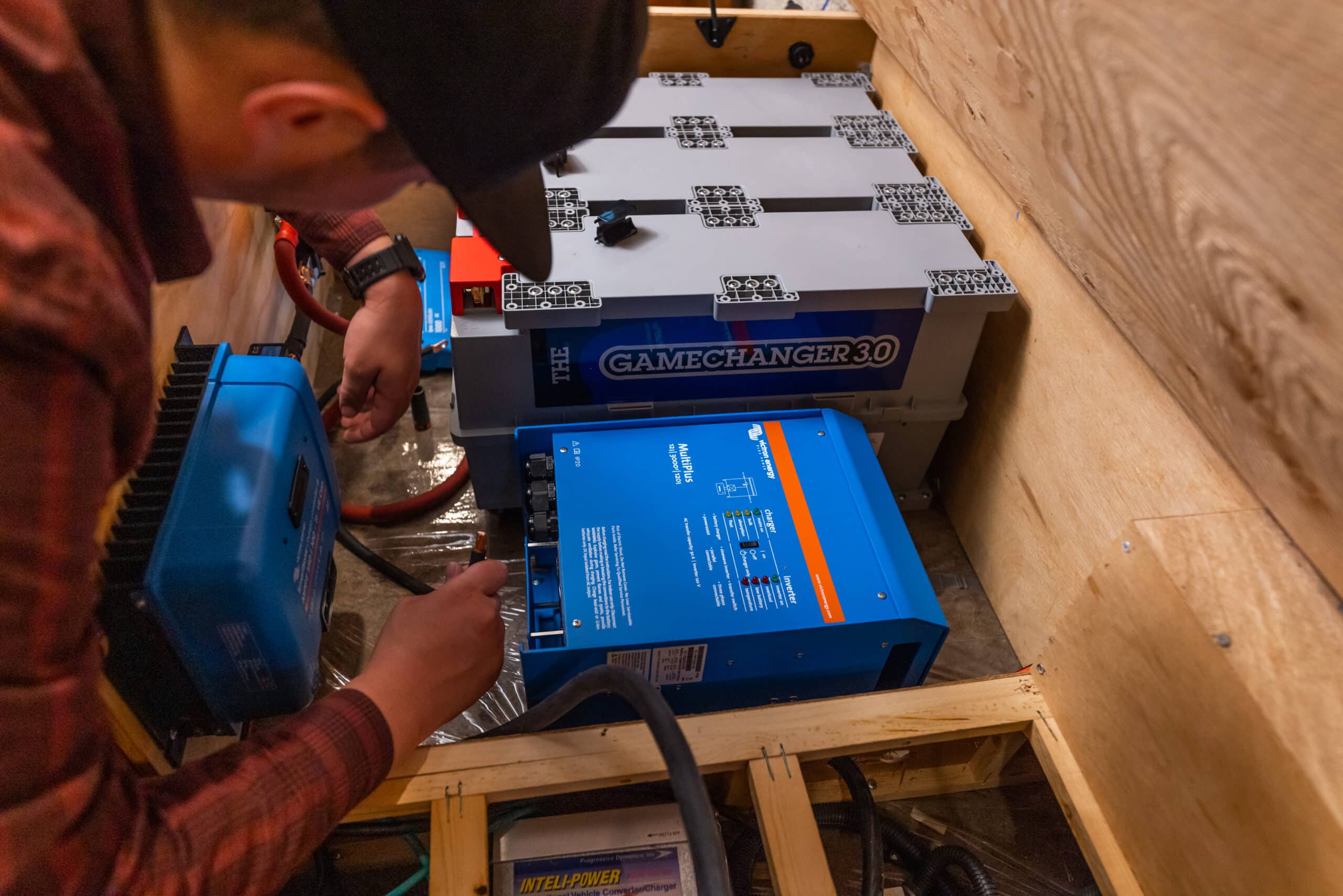
Lithium deep cycle batteries can endure multiple cycles of charging and discharging without experiencing a significant reduction in their capacity. Battle Born Batteries are designed for long-term use and can last up to 10 times longer than lead acid batteries, with 3,000-5,000 deep discharge cycles.
Along with their long life expectancy, a sufficient warranty, like the ten-year warranty that comes with many reputable lithium battery products, like Battle Born Batteries, makes them a solid choice for the best RV battery and many other applications. This extended warranty guarantees at least ten years of reliable power. The cost-effectiveness is particularly evident when considering the longer operational lifespan of lithium batteries, making them a more economically viable choice in the long run.
What most people desire out of their RV batteries is straightforward. People want an RV battery that delivers the energy it promises and functions effectively in diverse temperatures. Concisely, they want to have the power to turn on their AC when it’s hot, turn on their lights when it gets dark, and run their heater when the temperature drops. While reliability is essential, the best RV battery should be cost-effective over its lifetime. The best RV battery should offer sustained value over a significant period of time.
While deep cycle lithium batteries might have a higher upfront cost, the price over the long term is much more cost-effective than other technologies. Tom and Cait of Mortons on the Move did an incredible long-term cost analysis of different battery technologies, and the results are exciting.
The analysis of the deep cycle batteries yielded compelling insights in their studies. First, deep cycle lead acid batteries supremely underperformed, even under optimal conditions with low discharge rates. The test cut off the lead acid batteries at the manufacturer’s suggested voltages, yet they failed to meet their rated capacities. In contrast, lithium-ion batteries exhibited remarkable performance, surpassing their rated capacity across all discharge rates.
Another noteworthy finding was the cost-effectiveness comparison. Surprisingly, the more expensive AGM batteries that were tested performed worse in terms of cost per watt-hour. Flooded lead acid batteries proved to be the cheapest in all circumstances.
Now to the lifetime cost, specifically, of deep cycle batteries. In the Mortons’ study, lithium batteries emerged as the clear winner. The lifetime cost of lithium batteries is two to six times lower than lead acid batteries. This offers substantial savings in the long run.
The Morton’s study showed lithium batteries’ return on investment (ROI) was much higher than other battery technologies. Over time, the need for replacements decreases, significantly lowering the ownership cost. The minimal environmental impact of fewer replacements is also a significant plus for lithium batteries. Reduced battery replacements result in less waste generation and a lower ecological burden, contributing to a more sustainable future.
Another essential aspect of the ROI for lithium batteries is their recyclability. Recycling lithium batteries is becoming increasingly prevalent. This fact plays a crucial role in reducing the environmental impact of battery disposal. By recycling lithium batteries, we can recover valuable materials that can be reused. This promotes a circular approach to battery production and waste management.
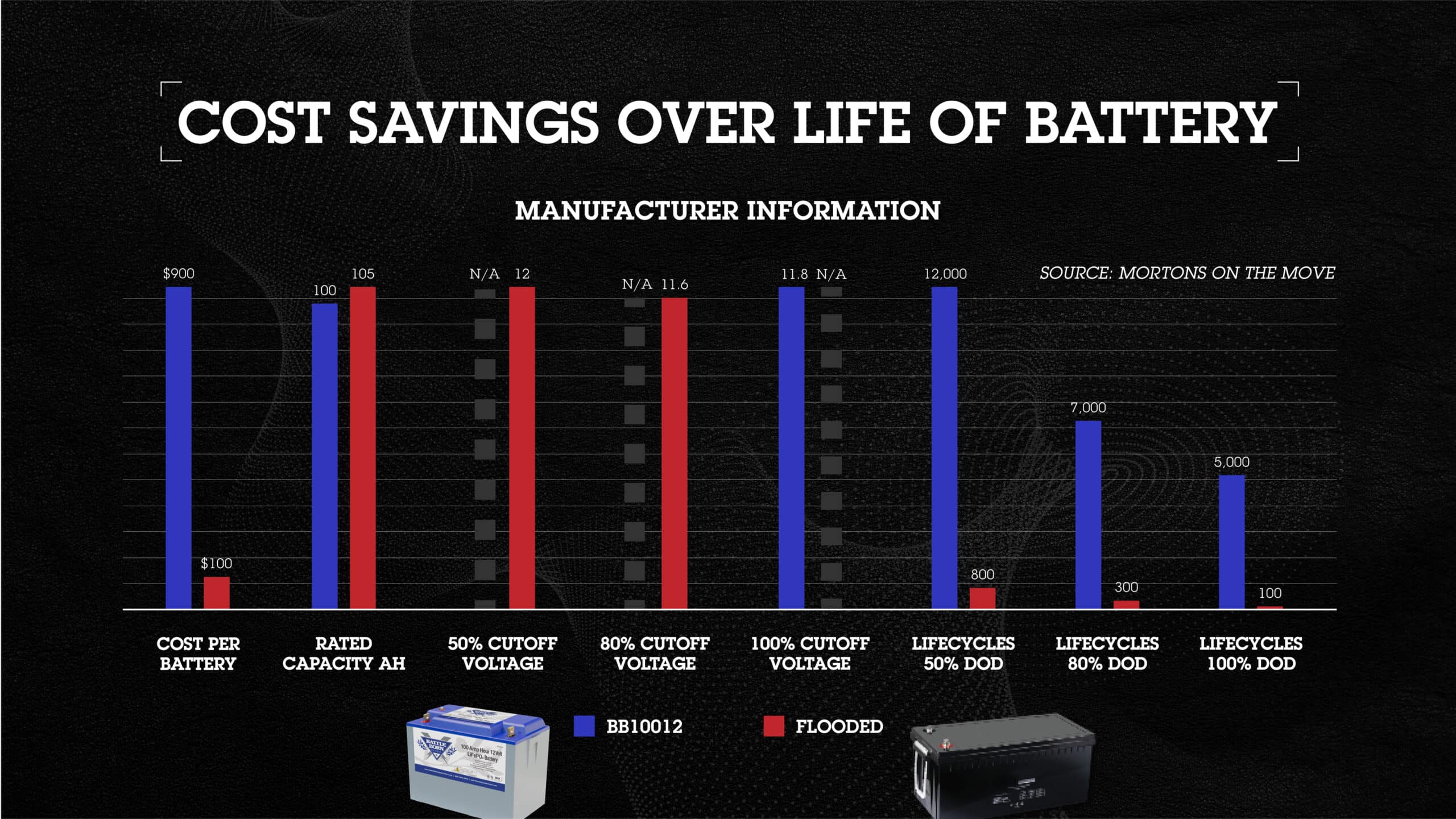
Lithium deep cycle batteries have revolutionized energy storage solutions, offering reliability and efficiency across many applications. The ROI for Battle Born lithium batteries is evident through a longer lifespan and a reduced overall cost. In addition, the minimal environmental impact from fewer replacements, recycling prospects, and industry-leading ten-year warranty make it a no-brainer for the best RV battery. Embracing lithium batteries is a strategic investment. Making an upgrade offers economic benefits and meets sustainability goals for a greener and more efficient future.
Shop Best Sellers

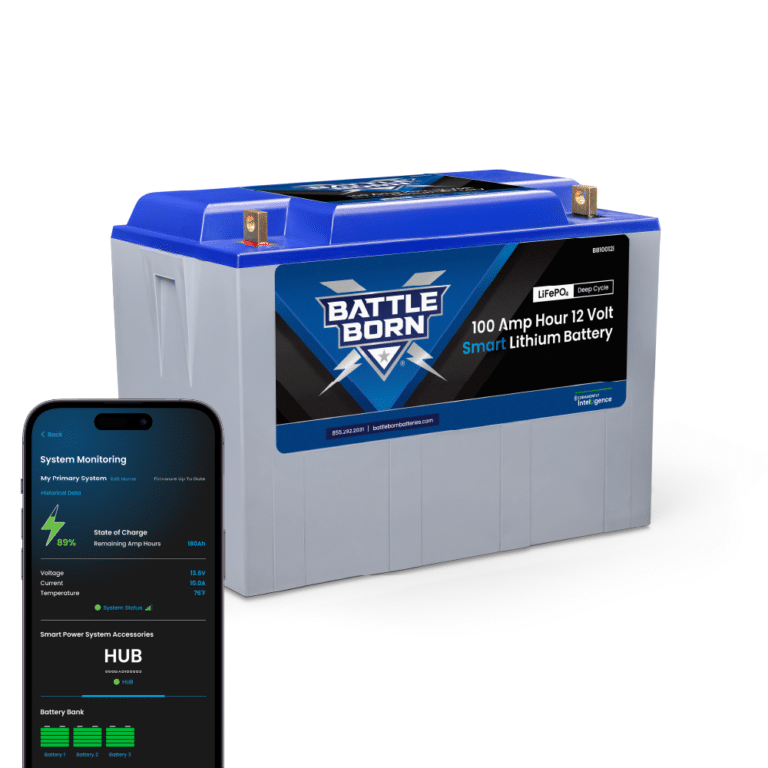

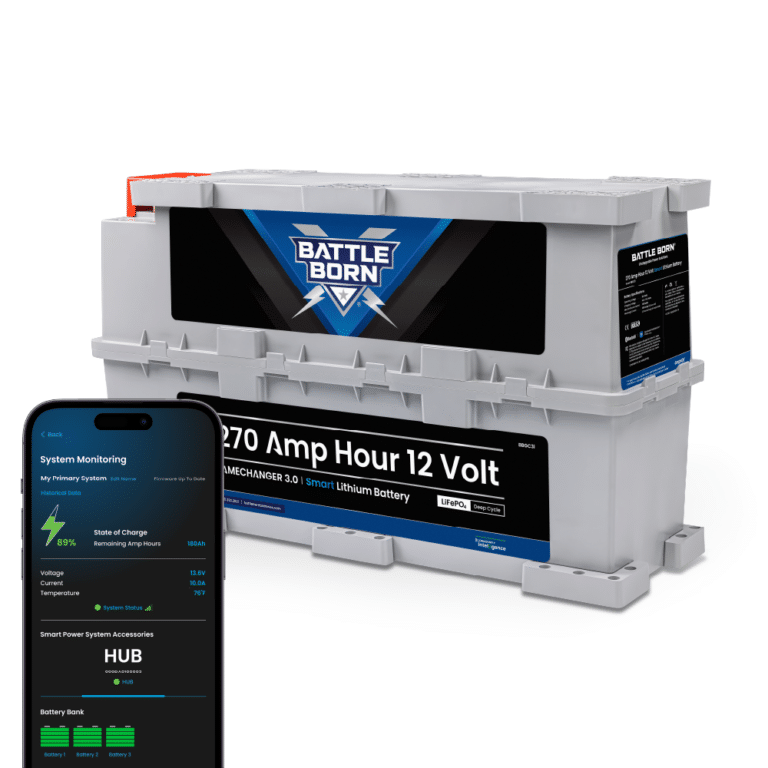




Ask a technical specialist now at 855.292.2831
Stay in the Know
4 thoughts on “How Long Do Lithium Deep Cycle Batteries for RVs Really Last?”
How do I determine which brand of lithium battery is most reliable?
See how we’re manufacturing the safest batteries on the market: https://dragonflyenergy.com/how-dragonfly-energy-is-manufacturing-the-safest-batteries-on-the-market/
We have a 10 year old RV with a 30 amp box, how big of a Lithium battery would the RV require. It has roof air but gas heat and gas water heater
Our Lithium Battery Calculator is here to help you determine the amp hours needed to run your must-haves in a lithium power system. Check it out here: https://battlebornbatteries.com/learn/calculator/